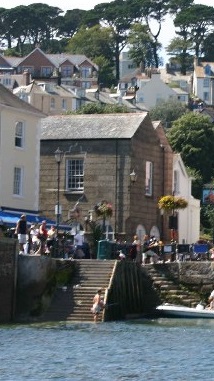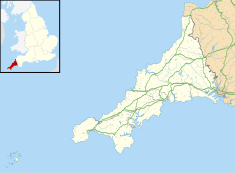Fowey Town Hall is a municipal building on the Town Quay in Fowey, Cornwall, England. The structure, which serves as meeting place of Fowey Town Council, is a Grade II listed building.[1]
| Fowey Town Hall | |
|---|---|
 Fowey Town Hall on the Town Quay | |
| Location | Town Quay, Fowey, Cornwall, England |
| Coordinates | 50°20′06″N 4°38′05″W / 50.3351°N 4.6346°W |
| Built | 1787 |
| Architectural style(s) | Neoclassical style |
Listed Building – Grade II | |
| Official name | The Town Hall |
| Designated | 13 March 1951 |
| Reference no. | 1290368 |
History
editThe site currently occupied by the town hall complex was originally inhabited by a 14th-century guild chapel.[2] The first municipal building on the site was a medieval single-storey merchant's house built in rubble masonry and completed in the 15th century. It was converted into a town hall, with a lock-up on the ground floor and an assembly room on the first floor, in the 17th century.[3] In the 1780s, two local members of parliament, Viscount Valletort and Philip Rashleigh, offered to commission a more substantial town hall for the borough. The site they selected was to the immediate east of the medieval town hall,[4] which then became the mayor's chambers.[5]
The new building was designed in the neoclassical style, built in granite ashlar and was completed in 1787.[6] The design involved a symmetrical main frontage of seven bays facing onto the Town Quay. There were seven round headed openings with voussoirs on the ground floor and three sash windows on the first floor. Internally, the principal rooms were a market hall, for the sale of meat and fish, on the ground floor,[7] and an assembly room, which featured a king post roof structure, on the first floor.[1]
The borough council, which had met in the council chamber, ceased to function in 1826.[8][9] Fowey had a very small electorate and two dominant patrons, William Rashleigh and Richard Edgcumbe, 2nd Earl of Mount Edgcumbe, which meant it was recognised by the UK Parliament as a rotten borough.[10] Its right to elect members of parliament was removed by the Reform Act 1832.[11] Following the implementation of the Municipal Corporations Act 1835, the corporation's assets, including the town hall, were transferred to the ownership of the lord of the manor, Joseph Thomas Austen (his surname changed to Treffry in 1838).[5][12]
Following the intervention of the future Lord Mayor of London, Sir Charles Hanson, who submitted a petition drawn up by the writer, Sir Arthur Quiller-Couch, Fowey became a municipal borough again in 1913.[13] The then lord of the manor, Charles Ebenezer Treffry, gave the town hall back to new borough council at that time. He also allowed the medieval town hall to be used as accommodation for the Fowey Museum.[5] Exhibits accessioned to the collection included a cloak worn by General Giuseppe Garibaldi, who unified Italy in the early 1860s and then arrived in Fowey in 1864: Garibaldi was visiting John Whitehead Peard who had accompanied Garibaldi on his campaigns and then retired to Fowey.[14][15] Exhibits also included Hanson's badge of office in his capacity as Sheriff of the City of London.[16]
A small aquarium, intended to display a variety of local fish and marine creatures, was established on the ground floor of the town hall in 1952.[17] The building continued to serve as the meeting place of the borough council for much of the 20th century, but ceased to be the local seat of government when the enlarged St Austell with Fowey Borough Council was formed in 1968. Following local government reorganisation in 1974, the town hall became the meeting place of Fowey Town Council.[18] Since then, the town hall has continued to serve as a community events venue.[19][20][21]
References
edit- ^ a b Historic England. "The Town Hall (1290368)". National Heritage List for England. Retrieved 12 August 2023.
- ^ Billington, Phil (2008). "Fabulous Fowey: A visitor's guide to Fowey and District" (PDF). Polperro Heritage Press. p. 14. ISBN 978-0955364853.
- ^ Historic England. "Fowey Museum (1210657)". National Heritage List for England. Retrieved 12 August 2023.
- ^ "Fowey Guide" (PDF). Peter Robinson. 2020. p. 9. Retrieved 12 August 2023.
- ^ a b c "History" (PDF). Fowey Town Council. Retrieved 10 August 2023.
- ^ "Fowey Conservation Area Character Appraisal and Management Proposals" (PDF). Cornwall Council. 1 March 2010. p. 24. Retrieved 12 August 2023.
- ^ "Town Quay". Fowey Harbour Heritage. Retrieved 10 August 2023.
- ^ Report of the Commissioners Appointed to Inquire Into the Municipal Corporations in England and Wales. Hansard. 1835. p. 505.
- ^ Chisholm, Hugh, ed. (1911). . Encyclopædia Britannica. Vol. 10 (11th ed.). Cambridge University Press. pp. 759–600.
- ^ "Parliamentary Reform Bill, For England". Hansard. 30 May 1832. Retrieved 10 August 2023.
- ^ "The History of Politics: The Rotten Boroughs of England". Julia Herdman Books. 21 April 2017. Retrieved 10 August 2023.
- ^ Burke, Sir Bernard (1884). The General Armory of England, Scotland, Ireland, and Wales, Comprising a Registry of Armorial Bearings from the Earliest to the Present Time. Vol. 3. Harrison and Sons. p. 1026.
- ^ "Fowey MB". Vision of Britain. Retrieved 10 August 2023.
- ^ "Fowey Museum". Cornwall Guide. Retrieved 10 August 2023.
- ^ "John Whitehead Peard, Soldier, 1811 to 1880". Fowey Harbour Heritage Society. Retrieved 10 August 2023.
- ^ "Fowey Museum". Cornwall Online. Retrieved 10 August 2023.
- ^ "About us". Fowey Aquarium. Retrieved 10 August 2023.
- ^ "Meetings, agendas and minutes". Fowey Town Council. Retrieved 10 August 2023.
- ^ "Troy Players Variety Show". Cornwall Air Ambulance Trust. Retrieved 10 August 2023.
- ^ "Flood meetings in Cornwall". Somerset County Gazette. 1 March 2008. Retrieved 10 August 2023.
- ^ "Fowey Food Week launches with tasting tour of the world". Cornwall Live. 29 January 2019. Retrieved 10 August 2023.
